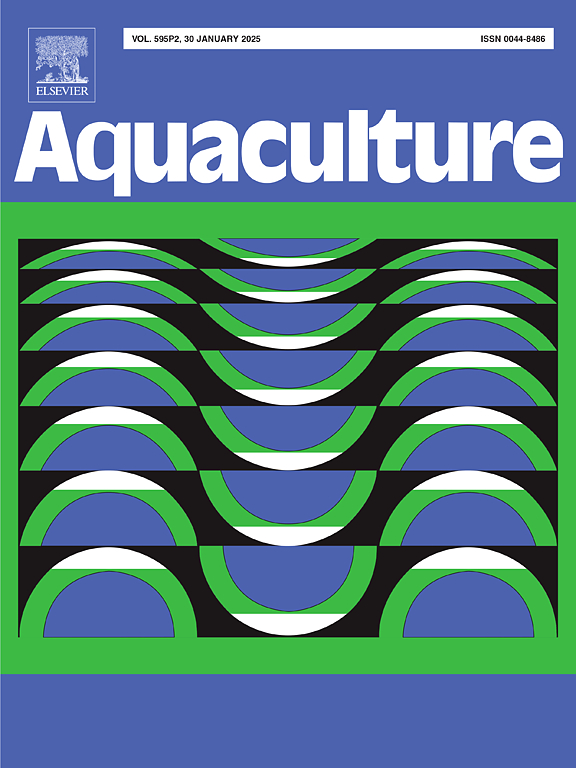Exploring polychaeta meal as a functional ingredient for improving European seabass intestinal health and oxidative status
IF 3.9
1区 农林科学
Q1 FISHERIES
引用次数: 0
Abstract
In intensive aquaculture, fish are often exposed to stressors like handling, overcrowding, and confinement, which can compromise health and welfare. Nutrition plays a key role in boosting physiological fitness and stress resilience. Polychaete meal (PM), derived from Alitta virens, is emerging as a promising low-trophic alternative to fishmeal (FM) with potential functional properties. This study evaluated the effects of dietary PM inclusion at 2.5 %, 5 %, and 10 % in European seabass (Dicentrarchus labrax), focusing on intestinal health, non-specific immunity, and oxidative status under both baseline and acute stress conditions. PM diets significantly reduced intestinal immune cell infiltration, particularly at 10 % (PM10), with fewer granulocytes in the anterior intestine (p = 0.009) and reduced lymphocyte presence in the rectum (p = 0.004). Significant metabolic changes were also observed, including significantly increased plasma glucose in fish fed PM10 (P = 0.017) and elevated lactate in the PM2.5 group (P = 0.004), regardless of stress exposure. The PM5 diet significantly enhanced non-specific immune responses, increasing complement activity (p = 0.026) and plasma immunoglobulin levels (p = 0.023). Antioxidant defenses were also significantly improved across all PM groups, with higher GST activity observed in all groups (p = 0.006) and elevated GSH content in PM2.5 and PM5 (p = 0.040). Under acute stress, all groups displayed similar physiological responses, including significant increases in glucose, lactate, and cortisol, as well as altered innate immune markers, without significant differences among diets. These findings suggest that PM can promote health and immune status in European seabass under optimal conditions. Further research is warranted to assess its functional benefits under more challenging aquaculture scenarios.
探讨多毛藻粉作为改善欧洲鲈鱼肠道健康和氧化状态的功能成分
在集约化水产养殖中,鱼类经常暴露在诸如处理、过度拥挤和禁闭等压力因素中,这可能会损害健康和福利。营养在促进生理健康和压力恢复能力方面起着关键作用。多毛藻(Polychaete meal, PM)是一种有潜力的低营养鱼粉替代品,具有潜在的功能特性。本研究评估了饲料中添加2.5%、5%和10% PM对欧洲鲈鱼(Dicentrarchus labrax)的影响,重点关注基线和急性应激条件下的肠道健康、非特异性免疫和氧化状态。PM日粮显著降低肠道免疫细胞浸润,特别是10% (PM10),前肠粒细胞减少(p = 0.009),直肠淋巴细胞减少(p = 0.004)。与应激暴露无关,还观察到显著的代谢变化,包括PM10组鱼的血糖显著升高(P = 0.017), PM2.5组鱼的乳酸水平升高(P = 0.004)。PM5饲粮显著增强了非特异性免疫反应,提高了补体活性(p = 0.026)和血浆免疫球蛋白水平(p = 0.023)。所有PM组的抗氧化防御能力也显著提高,所有PM组的GST活性均较高(p = 0.006), PM2.5和PM5中GSH含量均升高(p = 0.040)。在急性应激下,所有组都表现出相似的生理反应,包括葡萄糖、乳酸和皮质醇的显著增加,以及先天免疫标记物的改变,饮食之间没有显著差异。综上所述,在最佳条件下,PM可促进欧洲鲈鱼的健康和免疫状态。有必要进一步研究以评估其在更具挑战性的水产养殖情景下的功能效益。
本文章由计算机程序翻译,如有差异,请以英文原文为准。
求助全文
约1分钟内获得全文
求助全文
来源期刊

Aquaculture
农林科学-海洋与淡水生物学
CiteScore
8.60
自引率
17.80%
发文量
1246
审稿时长
56 days
期刊介绍:
Aquaculture is an international journal for the exploration, improvement and management of all freshwater and marine food resources. It publishes novel and innovative research of world-wide interest on farming of aquatic organisms, which includes finfish, mollusks, crustaceans and aquatic plants for human consumption. Research on ornamentals is not a focus of the Journal. Aquaculture only publishes papers with a clear relevance to improving aquaculture practices or a potential application.
 求助内容:
求助内容: 应助结果提醒方式:
应助结果提醒方式:


